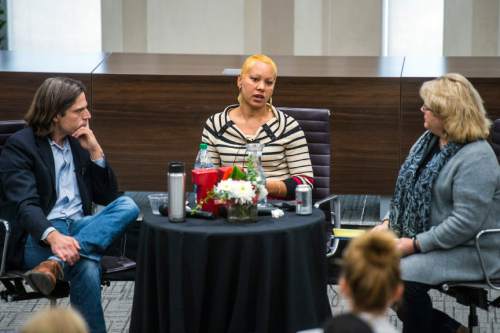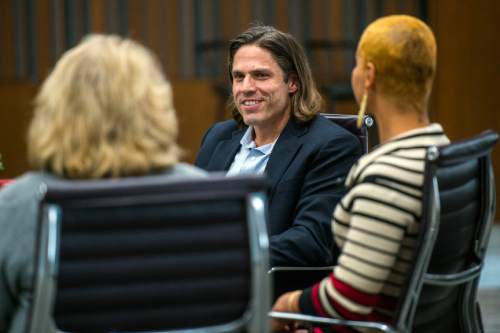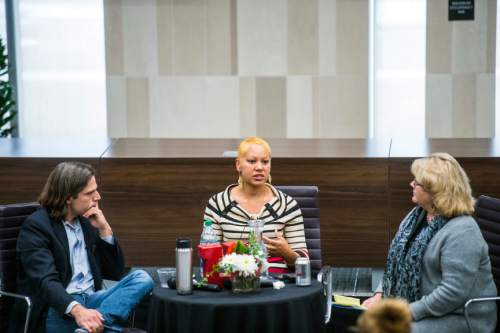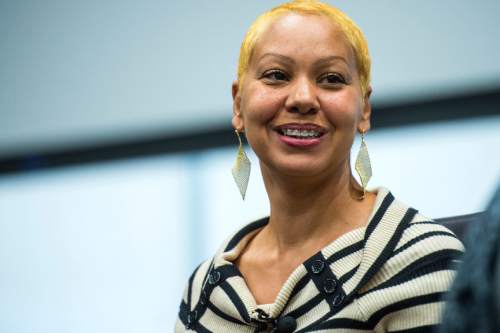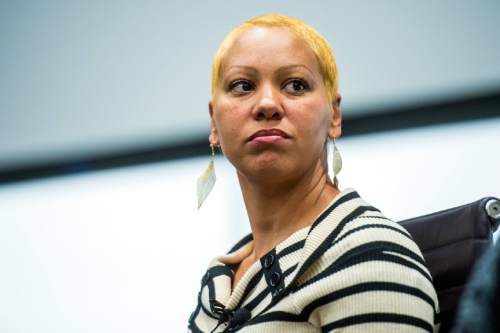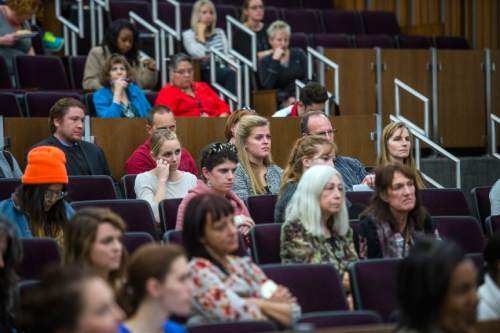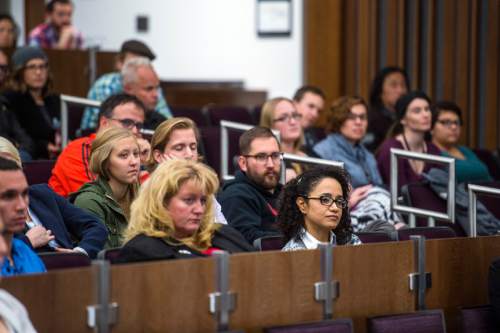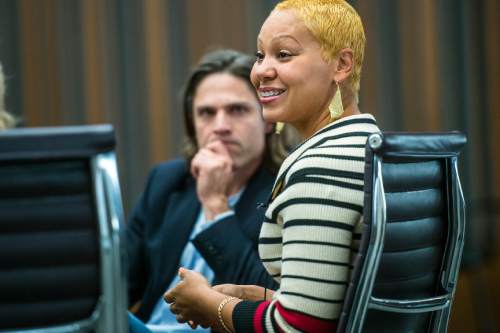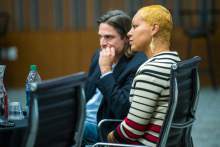This is an archived article that was published on sltrib.com in 2015, and information in the article may be outdated. It is provided only for personal research purposes and may not be reprinted.
When she was sentenced for killing the pimp who put her to work on the streets at age 13, teenager Sara Kruzan didn't really understand what life without parole meant.
She was overwhelmed and frightened when she realized her only way out of prison would be in a coffin.
"It was a difficult experience," Kruzan said, adding that there were times when she wanted to give up.
But she still had a sense of hope that she might not die behind bars. And that hope wasn't misguided.
Thanks to a group of attorneys who put hundreds of hours of free work into her case — including University of Utah law professor Michael Teter — the 37-year-old Kruzan was freed two years ago.
On Wednesday, Kruzan and Teter told the story of her legal battle as part of Pro Bono Week at the University of Utah's S.J. Quinney College of Law. This week's events are designed to encourage law students to participate in the Pro Bono Initiative, which allows them to work in real-world situations and serve the community under the supervision of volunteer attorneys.
Kruzan, who grew up in Riverside, Calif., was physically and sexually abused since birth, according to court documents. When she was 11, she met George Gilbert "G.G." Howard, a pimp in his 30s who began grooming her for prostitution, court records say.
"He was like a father figure," Kruzan said in "When I Die, They'll Send Me Home," a 2009 video made by Human Rights Watch.
Howard began taking Kruzan and her friends to the movies, the mall and roller-skating. Then he started spending more time alone with her, court documents say, and Howard first molested her when she was 11.
Kruzan said in the video that Howard told her, "You don't need to give it up for free" and put her to work on the streets as a prostitute when she was 13. Three years later, in early 1994, her boyfriend took her to stay at the home of a friend's uncle, court documents say.
On March 9, 1994, a few months after she turned 16, Kruzan made arrangements to meet Howard, who took her to a motel. She shot the pimp and stole $1,500 from him, later confessing to the crimes and claiming she acted at the direction of the friend's uncle, who had threatened to kill her mother if she didn't comply. (The uncle was never charged with those crimes.)
Kruzan was tried as an adult in Riverside Superior Court, convicted of first-degree murder while lying in wait and while in the course of a robbery, sentenced to life in prison without the possibility of parole plus four years and incarcerated at the Central California Women's Facility in Chowchilla.
"That means I'm going to die here," Kruzan says in the video.
She deserved punishment, Kruzan says, but she adds, "How much, I don't know."
The attorneys who took her case worked for the Seattle-based Perkins Coie law firm, which encouraged pro bono work. Teter, who then was based in the firm's Seattle office and came to the U. in 2011, said the lawyers worked more than 1,000 hours to free Kruzan.
They tackled the case through political and legal processes, asking for clemency from then-California Gov. Arnold Schwarzenegger and seeking a new trial in the courts. They had success on both fronts.
In 2011, Schwarzenegger commuted Kruzan's sentence to 25 years to life with the possibility of parole. The next year, the California Supreme Court sent the case back to Riverside Superior Court for a hearing on a petition asking that Kruzan's conviction be overturned and that she be granted a retrial.
Kruzan's attorneys then negotiated with the Riverside County district attorney to accept a second-degree murder conviction and a sentence of 15 years to life in prison. The deal made Kruzan immediately eligible for parole, Teter said.
The California Board of Parole Hearings granted her parole in 2013. Kruzan, then 35, was released Oct. 31, 2013, after serving 19 years behind bars.
Kruzan, who now lives in Orange County, Calif., with her 1-year-old daughter, works with organizations that promote justice-system reform. She said her lawyers "are not only my friends, they're my family."
She's also grateful for the support she got from her fellow inmates.
"My goal until I die is to restore the lives of those who I met while I was in prison because I couldn't be who I am had I not met those ladies," Kruzan said. "They raised me. They were there for me when nobody in the community was."
Teter encouraged all lawyers to offer their services for free to people who can't access the legal system without them. He cites his efforts on Kruzan's behalf as a highlight of his work.
"Sara's case made going to law school worth it," Teter said. "It's made my whole career."
Twitter: @PamelaMansonSLC


